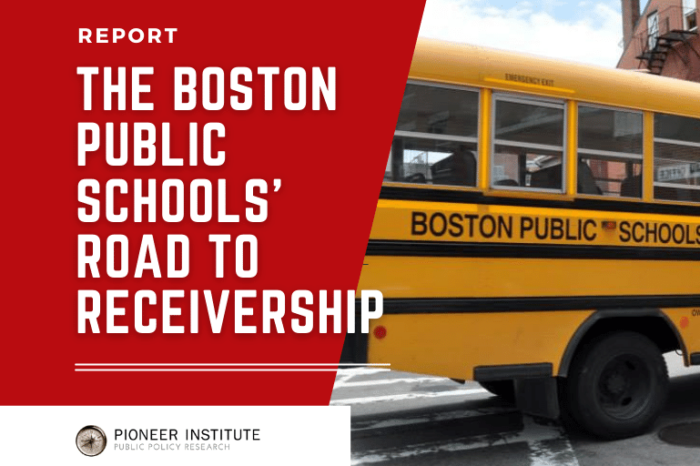Study Recommends State Receivership for Boston Public Schools
BPS has seen years of rapid decline despite being among the nation’s best-funded urban districts
BOSTON – After 15 years of rapid decline marked by low overall performance, yawning achievement gaps, instability, bureaucratic inertia and central office ineffectiveness in the Boston Public Schools (BPS), the Commonwealth should initiate receivership of the district, according to a new study published by Pioneer Institute.
“Boston’s schools are failing most students,” said Dr. Cara Candal, author of “The Boston Public Schools’ Road to Receivership.” The district has had generations to turn around chronically low-performing schools, and despite modest pockets of progress, it has been unable to sustain even small improvements.”
Watch: Pioneer Senior Fellow Cara Candal on Fixing the Boston Public Schools
According to a 2020 report from the Massachusetts Department of Elementary and Secondary Education (DESE), about a third of BPS students attend schools that rank in the bottom 10 percent statewide.
The report found no “clear, coherent district-wide strategy for supporting low-performing schools.” Rare cases of successful turnarounds have proven fleeting. In 2012, President Obama heralded the Orchard Gardens School as a model for turnarounds. By 2021, the state classified it as “needing assistance or intervention” because of consistently low performance.
DESE also reported that BPS had no coherent approach to teaching basic reading and writing skills, and there were no accountability measures when the lack of coordination inevitably led to poor outcomes.
As a result, the failures have taken the greatest toll on low-income students and students of color, who make up 58.3 percent and 87.5 percent, respectively, of the district’s enrollment. These students are drastically under-represented at the city’s exam schools and face long waitlists to attend Boston charter public schools. Without access to these high-performing options, underperforming BPS schools are usually their only alternative.
Among the key failures identified in the DESE report was the instability of top BPS leadership. With Superintendent Brenda Cassellius’ recent announcement that she will step down at the end of the school year, the district will be looking for its fifth superintendent in seven years.
The failures come despite a 2021 Census Bureau study in which Boston ranked second among the nation’s 100 largest districts in per-pupil spending. In fiscal 2018, per-pupil spending at BPS was 43 percent above the state average and the average teacher salary was 27 percent above the state norm.
BPS student enrollment also declined by more than 8,000 over the last decade, then dropped by more than another 2,000 in the Fall of 2021. Black enrollment is down 8 percent over the last three years, while White enrollment is essentially flat.
The district lost twice as many Black and Hispanic students in 2021 than it did White and Asian students, who are more likely to attend BPS’s higher-performing schools. Enrollment is holding steady in most Massachusetts school districts.
“The BPS are not ‘underperforming.’ Parents, students, the business community and the media all know—the Boston Public Schools are failing,” said Pioneer Executive Director Jim Stergios. “The question is: Why don’t our elected officials and the state and city education bureaucracies feel urgency to force change?”
For years, BPS schools have enrolled just a fraction of the students they’re capable of serving. Funding is tied to enrollment, and the district sends additional money to under-enrolled schools to ensure that they have the budget to provide basic services. In fiscal year 2022, more than three quarters of BPS schools are receiving these funds, at a cost of over $33 million.
“Spending to prop up schools with declining enrollment rather than deciding to close or consolidate them suggests the district lacks the will to make tough decisions that will ultimately benefit kids,” said Pioneer education policy director Jamie Gass.
Receivership generally gives the state, through an appointed receiver, broad power to intervene to improve schools. Potential actions include appointing a new school committee, renegotiating the district’s contract with the Boston Teachers’ Union, and bringing in outside partners.
The receivership could draw on lessons from the successful state intervention in Lawrence, which was headed by DESE Commissioner Jeffrey Riley, but it needs to be crafted to address Boston’s specific needs. Among the tools employed in Lawrence were high-quality, personalized tutoring; the intentional use of longer school days, and learning academies that were open during school vacations.
Dr. Candal recommends that one of the first tasks for the receiver should be to conduct an in-depth assessment of central office personnel. Offices or positions that don’t add value to the work of teachers and school leaders should be eliminated and the resources redirected into the classroom.
The historic infusion of more than $430 million in federal COVID relief funding would be better deployed providing resources for receivership than spent on approaches that have so clearly failed.
About the Author
Cara Stillings Candal is a Senior Fellow at Pioneer Institute. She has an extensive background in national and international education policy and teacher development, and she is the author/editor of numerous articles and several books about school university partnerships, charter schools, and other structural innovations in education.
About Pioneer
Pioneer Institute develops and communicates dynamic ideas that advance prosperity and a vibrant civic life in Massachusetts and beyond. Success for Pioneer is when the citizens of our state and nation prosper and our society thrives because we enjoy world-class options in education, healthcare, transportation and economic opportunity, and when our government is limited, accountable and transparent. Pioneer believes that America is at its best when our citizenry is well-educated, committed to liberty, personal responsibility, and free enterprise, and both willing and able to test their beliefs based on facts and the free exchange of ideas.
Get Updates on Our Education Research
Related Posts











